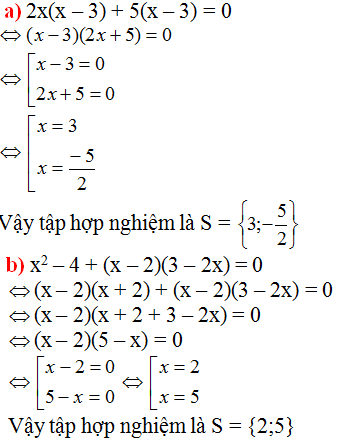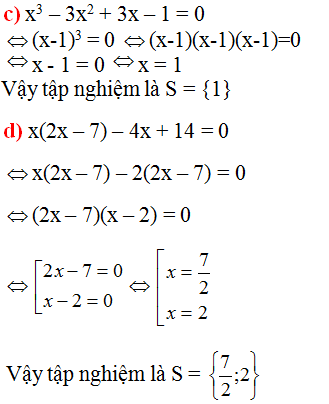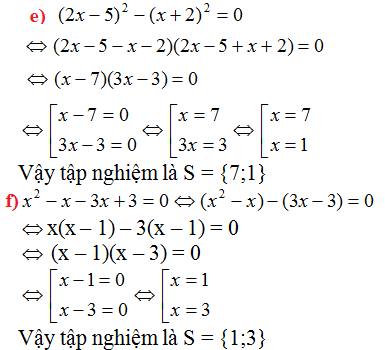Hãy nhập câu hỏi của bạn vào đây, nếu là tài khoản VIP, bạn sẽ được ưu tiên trả lời.

\(a,2x\left(x-3\right)+5\left(x-3\right)=0\)
\(\Leftrightarrow\left(2x+5\right)\left(x-3\right)=0\)
\(\Leftrightarrow\orbr{\begin{cases}2x+5=0\\x-3=0\end{cases}}\Leftrightarrow\orbr{\begin{cases}2x=-5\\x=3\end{cases}}\Leftrightarrow\orbr{\begin{cases}x=-\frac{5}{2}\\x=3\end{cases}}\)
Vậy .........
\(b,\left(x^2-4\right)+\left(x-2\right)\left(3-2x=0\right)\)
\(\Leftrightarrow x^2-4-2x^2+7x-6=0\)
\(\Leftrightarrow-x^2+7x-10=0\)
\(\Leftrightarrow-\left(x-5\right)\left(x-2\right)=0\)
\(\Leftrightarrow\orbr{\begin{cases}x=5\\x=2\end{cases}}\)
Vậy ..................
\(c,x^3-3x^2+3x-1=0\)
\(\Leftrightarrow\left(x-1\right)^3=0\)
\(\Leftrightarrow x=1\)
\(d,x\left(2x-7\right)-4x+14=0\)
\(\Leftrightarrow2x^2-7x-4x+14=0\)
\(\Leftrightarrow2x^2-11x+14=0\)
\(\Leftrightarrow\left(2x-7\right)\left(x-2\right)=0\)
\(\Leftrightarrow\orbr{\begin{cases}x=\frac{7}{2}\\x=2\end{cases}}\)
Vậy ............
\(e,\left(2x-5\right)^2-\left(x+2\right)^2=0\)
\(\Leftrightarrow4x^2-20x+25-x^2-4x-4=0\)
\(\Leftrightarrow3x^2-24x+21=0\)
\(\Leftrightarrow3\left(x-7\right)\left(x-1\right)=0\)
\(\Leftrightarrow\orbr{\begin{cases}x-7=0\\x-1=0\end{cases}}\Leftrightarrow\orbr{\begin{cases}x=7\\x=1\end{cases}}\)
Vậy .....................
\(f,x^2-x-\left(3x-3\right)=0\)
\(\Leftrightarrow x^2-x-3x+3=0\)
\(\Leftrightarrow x^2-4x+3=0\)
\(\Leftrightarrow\left(x-3\right)\left(x-1\right)=0\)
\(\Leftrightarrow\orbr{\begin{cases}x-3=0\\x-1=0\end{cases}}\Leftrightarrow\orbr{\begin{cases}x=3\\x=1\end{cases}}\)
Vậy ..............

a) Ta có: \(\frac{\left(2x+1\right)^2}{5}-\frac{\left(x-1\right)^2}{3}=\frac{7x^2-14x-5}{15}\)
\(\Leftrightarrow\frac{\left(2x+1\right)^2\cdot3}{15}-\frac{5\left(x-1\right)^2}{15}-\frac{7x^2-14x-5}{15}=0\)
\(\Leftrightarrow3\left(4x^2+4x+1\right)-5\left(x^2-2x+1\right)-7x^2+14x+5=0\)
\(\Leftrightarrow12x^2+12x+3-5x^2+10x-5-7x^2+14x+5=0\)
\(\Leftrightarrow36x+3=0\)
\(\Leftrightarrow36x=-3\)
\(\Leftrightarrow x=\frac{-3}{36}\)
Vậy: \(x=\frac{-3}{36}\)
b) Ta có: \(\frac{201-x}{99}+\frac{203-x}{97}=\frac{205-x}{95}+3=0\)
\(\Leftrightarrow\frac{201-x}{99}+\frac{203-x}{97}-\frac{205-x}{95}-3=0\)
\(\Leftrightarrow\left(\frac{201-x}{99}+1\right)+\left(\frac{203-x}{97}+1\right)+\left(\frac{205-x}{95}+1\right)=0\)
\(\Leftrightarrow\frac{201-x+99}{99}+\frac{203-x+97}{97}+\frac{205-x+95}{95}=0\)
\(\Leftrightarrow\frac{300-x}{99}+\frac{300-x}{97}+\frac{300-x}{95}=0\)
\(\Leftrightarrow\left(300-x\right)\left(\frac{1}{99}+\frac{1}{97}+\frac{1}{95}\right)=0\)
Vì \(\frac{1}{99}+\frac{1}{97}+\frac{1}{95}\ne0\)
nên 300-x=0
\(\Leftrightarrow x=300\)
Vậy: x=300
c) Ta có: \(x^3+x^2+x+1=0\)
\(\Leftrightarrow x^2\left(x+1\right)+\left(x+1\right)=0\)
\(\Leftrightarrow\left(x+1\right)\left(x^2+1\right)=0\)(1)
Ta có: \(x^2\ge0\forall x\)
\(\Rightarrow x^2+1\ge1\ne0\forall x\)(2)
Từ (1) và (2) suy ra x+1=0
hay x=-1
Vậy: x=-1
d) Ta có: \(\left(x-1\right)x\left(x+1\right)\left(x+2\right)=24\)
\(\Leftrightarrow\left(x^2+x\right)\left(x^2+x-2\right)=24\)
Đặt \(x^2+x-1=t\)
\(\Leftrightarrow\left(t+1\right)\left(t-1\right)=24\)
\(\Leftrightarrow t^2-1-24=0\)
\(\Leftrightarrow t^2-25=0\)
\(\Leftrightarrow\left(t-5\right)\left(t+5\right)=0\)
\(\Leftrightarrow\left(x^2+x-1-5\right)\left(x^2+x-1+5\right)=0\)
\(\Leftrightarrow\left(x^2+x-6\right)\left(x^2+x+4\right)=0\)
\(\Leftrightarrow\left(x^2+3x-2x-6\right)\left(x^2+2\cdot x\cdot\frac{1}{2}+\frac{1}{4}+\frac{15}{4}\right)=0\)
\(\Leftrightarrow\left(x+3\right)\left(x-2\right)\left[\left(x+\frac{1}{2}\right)^2+\frac{15}{4}=0\right]\)(3)
Ta có: \(\left(x+\frac{1}{2}\right)^2\ge0\forall x\)
\(\Rightarrow\left(x+\frac{1}{2}\right)^2+\frac{15}{4}\ge\frac{15}{4}\ne0\forall x\)(4)
Từ (3) và (4) suy ra
\(\left[{}\begin{matrix}x+3=0\\x-2=0\end{matrix}\right.\Leftrightarrow\left[{}\begin{matrix}x=-3\\x=2\end{matrix}\right.\)
Vậy: \(x\in\left\{-3;2\right\}\)
e) Ta có: \(\left(5x-3\right)-\left(4x-7\right)=0\)
\(\Leftrightarrow5x-3-4x+7=0\)
\(\Leftrightarrow x+4=0\)
\(\Leftrightarrow x=-4\)
Vậy: x=-4
f) Ta có: \(3x^2+2x-1=0\)
\(\Leftrightarrow3x^2+3x-x-1=0\)
\(\Leftrightarrow3x\left(x+1\right)-\left(x+1\right)=0\)
\(\Leftrightarrow\left(x+1\right)\left(3x-1\right)=0\)
\(\Leftrightarrow\left[{}\begin{matrix}x+1=0\\3x-1=0\end{matrix}\right.\Leftrightarrow\left[{}\begin{matrix}x=-1\\3x=1\end{matrix}\right.\Leftrightarrow\left[{}\begin{matrix}x=-1\\x=\frac{1}{3}\end{matrix}\right.\)
Vậy: \(x\in\left\{-1;\frac{1}{3}\right\}\)
g) Ta có: \(x^2+6x-16=0\)
\(\Leftrightarrow x^2-2x+8x-16=0\)
\(\Leftrightarrow x\left(x-2\right)+8\left(x-2\right)=0\)
\(\Leftrightarrow\left(x-2\right)\left(x+8\right)=0\)
\(\Leftrightarrow\left[{}\begin{matrix}x-2=0\\x+8=0\end{matrix}\right.\Leftrightarrow\left[{}\begin{matrix}x=2\\x=-8\end{matrix}\right.\)
Vậy: \(x\in\left\{2;-8\right\}\)
h) Ta có: \(x^2+3x-10=0\)
\(\Leftrightarrow x^2+5x-2x-10=0\)
\(\Leftrightarrow x\left(x+5\right)-2\left(x+5\right)=0\)
\(\Leftrightarrow\left(x+5\right)\left(x-2\right)=0\)
\(\Leftrightarrow\left[{}\begin{matrix}x+5=0\\x-2=0\end{matrix}\right.\Leftrightarrow\left[{}\begin{matrix}x=-5\\x=2\end{matrix}\right.\)
Vậy: \(x\in\left\{-5;2\right\}\)
i) Ta có: \(x^2+x-2=0\)
\(\Leftrightarrow x^2-x+2x-2=0\)
\(\Leftrightarrow x\left(x-1\right)+2\left(x-1\right)=0\)
\(\Leftrightarrow\left(x-1\right)\left(x+2\right)=0\)
\(\Leftrightarrow\left[{}\begin{matrix}x-1=0\\x+2=0\end{matrix}\right.\Leftrightarrow\left[{}\begin{matrix}x=1\\x=-2\end{matrix}\right.\)
Vậy: \(x\in\left\{1;-2\right\}\)
k) Ta có: \(3x^2+7x+2=0\)
\(\Leftrightarrow3x^2+6x+x+2=0\)
\(\Leftrightarrow3x\left(x+2\right)+\left(x+2\right)=0\)
\(\Leftrightarrow\left(x+2\right)\left(3x+1\right)=0\)
\(\Leftrightarrow\left[{}\begin{matrix}x+2=0\\3x+1=0\end{matrix}\right.\Leftrightarrow\left[{}\begin{matrix}x=-2\\3x=-1\end{matrix}\right.\Leftrightarrow\left[{}\begin{matrix}x=-2\\x=\frac{-1}{3}\end{matrix}\right.\)
Vậy: \(x\in\left\{-2;\frac{-1}{3}\right\}\)
l) Ta có: \(4x^2-12x+5=0\)
\(\Leftrightarrow4x^2-2x-10x+5=0\)
\(\Leftrightarrow2x\left(2x-1\right)-5\left(2x-1\right)=0\)
\(\Leftrightarrow\left(2x-1\right)\left(2x-5\right)=0\)
\(\Leftrightarrow\left[{}\begin{matrix}2x-1=0\\2x-5=0\end{matrix}\right.\Leftrightarrow\left[{}\begin{matrix}2x=1\\2x=5\end{matrix}\right.\Leftrightarrow\left[{}\begin{matrix}x=\frac{1}{2}\\x=\frac{5}{2}\end{matrix}\right.\)
Vậy: \(x\in\left\{\frac{1}{2};\frac{5}{2}\right\}\)

a) \(5x\left(3x-7\right)-15x\left(x-1\right)=3\)
\(\Rightarrow15x^2-35x-15x^2+15x=3\)
\(\Rightarrow-20x=3\)
\(\Rightarrow x=-\dfrac{3}{20}\)
b) \(\left(4x+2\right)\left(6x-3\right)-\left(8x+5\right)\left(3x-4\right)=2\)
\(\Rightarrow24x^2+12x-12x-6-24x^2-15x+24x+20=2\)
\(\Rightarrow9x+14=2\)
\(\Rightarrow9x=-12\)
\(\Rightarrow x=-\dfrac{4}{3}\)
c) \(7x^2-21x=0\)
\(\Rightarrow7x\left(x-3\right)=0\)
\(\Rightarrow\left[{}\begin{matrix}7x=0\\x-3=0\end{matrix}\right.\Rightarrow\left[{}\begin{matrix}x=0\\x=3\end{matrix}\right.\)
d) \(9x^2-6x+1=0\)
\(\Rightarrow\left(3x\right)^2-2.3x+1=0\)
\(\Rightarrow\left(3x-1\right)^2=0\)
\(\Rightarrow3x-1=0\)
\(\Rightarrow3x=1\)
\(\Rightarrow x=\dfrac{1}{3}\)
e) \(16x^2-49=0\)
\(\Rightarrow\left(4x\right)^2-7^2=0\)
\(\Rightarrow\left(4x-7\right)\left(4x+7\right)=0\)
\(\Rightarrow\left[{}\begin{matrix}4x-7=0\\4x+7=0\end{matrix}\right.\)
\(\Rightarrow\left[{}\begin{matrix}4x=7\\4x=-7\end{matrix}\right.\Rightarrow\left[{}\begin{matrix}x=\dfrac{7}{4}\\x=-\dfrac{7}{4}\end{matrix}\right.\)
f) \(5x^3-20x=0\)
\(\Rightarrow5x\left(x^2-4\right)=0\)
\(\Rightarrow\left[{}\begin{matrix}5x=0\\x^2-4=0\end{matrix}\right.\)
\(\Rightarrow\left[{}\begin{matrix}x=5\\x^2=4\end{matrix}\right.\Rightarrow\left[{}\begin{matrix}x=5\\x=2\\x=-2\end{matrix}\right.\)

a) \(x^4+2x^3-3x^2-8x-4=0\)
\(\Leftrightarrow x^4-2x^3+4x^3-8x^2+5x^2-10x+2x-4=0\)
\(\Leftrightarrow x^3\left(x-2\right)+4x^2\left(x-2\right)+5x\left(x-2\right)+2\left(x-2\right)=0\)
\(\Leftrightarrow\left(x-2\right)\left(x^3+4x^2+5x+2\right)=0\)
\(\Leftrightarrow\left(x-2\right)\left(x^3+x^2+3x^2+3x+2x+2\right)=0\)
\(\Leftrightarrow\left(x-2\right)\left[x^2\left(x+1\right)+3x\left(x+1\right)+2\left(x+1\right)\right]=0\)
\(\Leftrightarrow\left(x-2\right)\left(x+1\right)\left(x^2+3x+2\right)=0\)
\(\Leftrightarrow\left(x-2\right)\left(x+1\right)\left(x^2+2x+x+2\right)=0\)
\(\Leftrightarrow\left(x-2\right)\left(x+1\right)\left[x\left(x+2\right)+\left(x+2\right)\right]=0\)
\(\Leftrightarrow\left(x-2\right)\left(x+1\right)\left(x+2\right)\left(x+1\right)=0\)
\(\Leftrightarrow\left(x-2\right)\left(x+1\right)^2\left(x+2\right)=0\)
\(\Rightarrow x\in\left\{2;-1;-2\right\}\)
Vậy....
c, \(2x^3+7x^2+7x+2=0\)
\(\Leftrightarrow2\left(x^3+1\right)+7x\left(x+1\right)=0\Leftrightarrow2\left(x+1\right)\left(x^2-x+1\right)+7x\left(x+1\right)=0\)
\(\Leftrightarrow\left(x+1\right)\left[2\left(x^2-x+1\right)+7x\right]=0\)
\(\Leftrightarrow\left(x+1\right)\left(2x^2+5x+2\right)=0\Leftrightarrow\left(x+1\right)\left(x+2\right)\left(2x+1\right)=0\)
Tập nghiệm của pt: \(S=\left\{-1;-2;-\frac{1}{2}\right\}\)
b, \(\left(x-2\right)\left(x+2\right)\left(x^2-10\right)=72\Leftrightarrow\left(x^2-4\right)\left(x^2-10\right)=72\) (1)
Đặt: \(x^2-7=t\left(t\ge-7\right)\)
Khi đó (1) trở thành: \(\left(t+3\right)\left(t-3\right)=72\Leftrightarrow t^2-9=72\Leftrightarrow\orbr{\begin{cases}t=9\\t=-9\left(loai\right)\end{cases}}\)
\(t=9\Rightarrow x^2-7=9\Leftrightarrow x=\pm4\)
Tập nghiệm của pt là \(S=\left\{\pm4\right\}\)
a, \(x^4+2x^3-3x^2-8x-4=0\)
\(\Leftrightarrow x^3\left(x+1\right)+x^2\left(x+1\right)-4x\left(x+1\right)-4\left(x+1\right)=0\)
\(\Leftrightarrow\left(x+1\right)\left(x^3+x^2-4x-4\right)=0\)
\(\Leftrightarrow\left(x+1\right)^2\left(x^2-4\right)=0\Leftrightarrow\orbr{\begin{cases}x=-1\\x=\pm2\end{cases}}\)

câu a, b, c dễ mà. Bạn áp dụng 7 hằng đẳng thúc là làm đc thoii!!
vd: a) \(\left(9x^2-4\right)\left(x+1\right)=\left(3x+2\right)\left(x^2-1\right)\)
\(\Rightarrow\left(3x-2\right)\left(3x+2\right)\left(x+1\right)=\left(3x+2\right)\left(x-1\right)\left(x+1\right)\)
\(\Rightarrow\left(3x-2\right)\left(3x+2\right)-\left(3x+2\right)\left(x-1\right)\left(x+1\right)=0\)
\(\Rightarrow\left(3x+2\right)\left(x+1\right)[\left(3x-2\right)-\left(x-1\right)]=0\)
\(\Rightarrow\left(3x+2\right)\left(x+1\right)\left(2x-1\right)=0\) (bạn phá ngoặc ra rồi tính là ra bước này)
\(\Leftrightarrow3x+2=0\) hoặc \(x+1=0\) hoặc \(2x-1=0\) ( đến đây bạn chia làm 3 trường hợp r tự tính nhé)
Chúc bạn học tốt!!
d/
\(\Leftrightarrow x^3\left(x+1\right)+\left(x+1\right)=0\)
\(\Leftrightarrow\left(x^3+1\right)\left(x+1\right)=0\)
\(\Leftrightarrow\left[{}\begin{matrix}x+1=0\\x^3+1=0\end{matrix}\right.\) \(\Rightarrow x=-1\)
e/
\(\Leftrightarrow x^3+x^2-6x-x^2-x+6=0\)
\(\Leftrightarrow x\left(x^2+x-6\right)-\left(x^2+x-6\right)=0\)
\(\Leftrightarrow\left(x-1\right)\left(x^2+x-6\right)=0\)
\(\Leftrightarrow\left(x-1\right)\left(x-2\right)\left(x+3\right)=0\)
\(\Rightarrow\left[{}\begin{matrix}x=1\\x=2\\x=-3\end{matrix}\right.\)



a, (3x-1)2 - (x+3)2 = 0
<=> [(3x-1)-(x+3)][(3x-1)+(x+3)] = 0
<=> (3x-1-x-3)(3x-1+x+3) = 0
<=> (2x-4)(4x+2) = 0
=> 2x-4=0 hoặc 4x+2=0
=> 2x =4 hoặc 4x = -2
=> x = 2 hoặc x = \(\frac{-1}{2}\)
\(\begin{array}{l} a){\left( {3x - 1} \right)^2} - {\left( {x + 3} \right)^2} = 0\\ \Leftrightarrow \left( {3x - 1 + x + 3} \right)\left[ {3x - 1 - x - 3} \right] = 0\\ \Leftrightarrow \left( {4x + 2} \right)\left( {2x - 4} \right) = 0\\ \Leftrightarrow \left[ \begin{array}{l} 4x + 2 = 0\\ 2x - 4 = 0 \end{array} \right. \Leftrightarrow \left[ \begin{array}{l} x = - \dfrac{1}{2}\\ x = 2 \end{array} \right.\\ b){x^3} - \dfrac{x}{{49}} = 0\\ \Leftrightarrow 49{x^3} - x = 0\\ \Leftrightarrow x\left( {49{x^2} - 1} \right) = 0\\ \Leftrightarrow \left[ \begin{array}{l} x = 0\\ 49{x^2} - 1 = 0 \end{array} \right. \Leftrightarrow \left[ \begin{array}{l} x = 0\\ x = \pm \dfrac{1}{7} \end{array} \right.\\ c){x^2} - 7x + 12 = 0\\ \Leftrightarrow {x^2} - 3x - 4x + 12 = 0\\ \Leftrightarrow x\left( {x - 3} \right) - 4\left( {x - 3} \right) = 0\\ \Leftrightarrow \left( {x - 3} \right)\left( {x - 4} \right) = 0\\ \Leftrightarrow \left[ \begin{array}{l} x - 3 = 0\\ x - 4 = 0 \end{array} \right. \Leftrightarrow \left[ \begin{array}{l} x = 3\\ x = 4 \end{array} \right.\\ d)4{x^2} - 3x - 1 = 0\\ \Leftrightarrow 4{x^2} + x - 4x - 1 = 0\\ \Leftrightarrow x\left( {4x + 1} \right) - \left( {4x + 1} \right) = 0\\ \Leftrightarrow \left( {4x + 1} \right)\left( {x - 1} \right) = 0\\ \Leftrightarrow \left[ \begin{array}{l} 4x + 1 = 0\\ x - 1 = 0 \end{array} \right. \Leftrightarrow \left[ \begin{array}{l} x = - \dfrac{1}{4}\\ x = 1 \end{array} \right.\\ e){x^3} - 2x - 4 = 0\\ \Leftrightarrow {x^3} - 4x + 2x - 4 = 0\\ \Leftrightarrow x\left( {{x^2} - 4} \right) + 2\left( {x - 2} \right) = 0\\ \Leftrightarrow x\left( {x - 2} \right)\left( {x + 2} \right) + 2\left( {x - 2} \right) = 0\\ \Leftrightarrow \left( {x - 2} \right)\left[ {x\left( {x + 2} \right) + 2} \right] = 0\\ \Leftrightarrow \left( {x - 2} \right)\left( {{x^2} + 2x + 2} \right) = 0\\ \Leftrightarrow \left[ \begin{array}{l} x - 2 = 0\\ {x^2} + 2x + 2 = 0 \end{array} \right. \Leftrightarrow \left[ \begin{array}{l} x = 2\\ {x^2} + 2x + 2x = 0\left( {VN} \right) \end{array} \right.\\ f){x^3} + 8{x^2} + 17x + 10 = 0\\ \Leftrightarrow \left( {x + 1} \right)\left( {{x^2} + 7x + 10} \right) = 0\\ \Leftrightarrow \left( {x + 1} \right)\left( {{x^2} + 5x + 2x + 10} \right) = 0\\ \Leftrightarrow \left( {x + 1} \right)\left[ {x\left( {x + 5} \right) + 2\left( {x + 5} \right)} \right] = 0\\ \Leftrightarrow \left( {x + 1} \right)\left( {x + 5} \right)\left( {x + 2} \right) = 0\\ \Leftrightarrow \left[ \begin{array}{l} x + 1 = 0\\ x + 5 = 0\\ x + 2 = 0 \end{array} \right. \Leftrightarrow \left[ \begin{array}{l} x = - 1\\ x = - 5\\ x = - 2 \end{array} \right. \end{array}\)